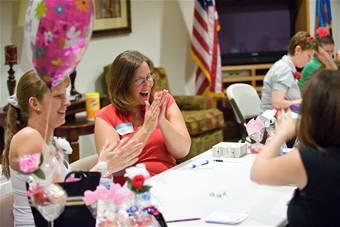Hi, I’m Amy, and I’m a doer.
My malady is both a blessing and a curse. I am, at turns, among the most helpful and engaged MilSpouses on the planet -- and the one in the biggest denial. If I can think of something to do, I do it. If I don’t know where to start, I’m on the first train to Denial Land where are there are no problems and everything just dandy, thank you for asking.
The upcoming May 6 Military Spouse Appreciation Day has had me thinking about what I, a military spouse, can do to take part. (Because, obviously, something must be done). While I totally support self-appreciation, I figure there’s a more appropriate and less, um, selfish way to celebrate than treating myself to a pedicure and an I Love Amy fest, as fun as those are.*
And then I remembered the most out of sight and mind (in my opinion), support hungry spouse group out there: the caretaker spouses of our wounded warriors. Many of these people devote all of their time to caring for and assisting their injured warrior – leaving little to no time for them to take care of themselves or remind me that they are out there needing a hand. The role of a caretaker can be scary, uncertain, confusing, exhausting and so much more.
I spent some time recently touching base with a few of these incredible people, most of whom have transitioned from helping their husband through Defense Department’s medical care to the Veteran’s Affairs Department. These simply aren’t ladies you are going to run into on base – you have to remember they need you all on your own.
Maybe it was my doer-ness rearing its head and trying to make sure something was, well, being done. Or maybe I was trying to make myself feel better for keeping my summer home in Denial Land. Whatever it was, my first question to them was whether if, before anything else, they felt like they got from the military when they were in it the help they needed to figure out how to navigate their new spouse role.
The answer, they said, is “no.”
“There was none at all,” said Serena Bowen, whose husband was injured in Iraq in 2003 when he inhaled an unknown chemical agent. “I’m learning coping skills as I go. Sometimes I feel like I need better skills to know how to handle the situation.”
Cheryl Gansner, whose husband was injured in 2006, agreed.
“When [my husband] was laying in the hospital bed I said ‘is there some kind of manual on this, I don’t know what I’m doing here.’ They laughed at me,” she said.
These spouses really are relying completely on the care and compassion of their support community. While they do have networks through groups like Operation Homefront’s Wounded Warrior Wives, other MilSpouses need to take a significant part in holding these people up as they help their servicemember battle wounds both seen and hidden.
But how?
Angela Maschek, whose husband was injured in Iraq in 2008 and is now studying at Columbia University, said it’s the little things like a call from a friend or a card from a stranger that make the long days at hospitals and in doctor’s offices just a little bit easier. Just knowing that they are being thought of at all, she said, is uplifting.
“Anytime we got a card from anyone … it always makes you feel good that someone has taken time to write a letter, say ‘thank you,’” she said. “Just make it clear that you’re there 100 percent to support them, and if they’re scared they can call you – that you’re a safe place.”
Pam Eggleston, director of development at Blue Star Families and a caretaker spouse, said we can help by getting involved in organizations like hers, which is a voice for the families of servicemembers across the country.
“Become an advocate for the military, the military spouses and wounded warriors, and if you don’t know how to do than seek out organizations that are doing those things,” she said.
According to the spouses I spoke with, the only thing that is not helpful is doing nothing. Yes, we all have incredibly busy lives just within our existent circles of families and friends. But those who are supporting our wounded warriors cannot do it without others watching their backs. Denial is not the answer to this one.
So here’s my plan for Military Spouse Appreciation day: since I don’t have any close friends whose spouses have been seriously injured and I don’t live near a major recovery hospital, I’m going to take five minutes and write a card and find a way to get it a wounded spouse. When I figure out the best way to make that happen, I’ll let you know so you can do it too.
Doers unite!
*Look. If you also want to have an I Love Amy fest after we love on our caretakers spouses a bit, I could be pretty easily convinced to participate. … just being honest.









